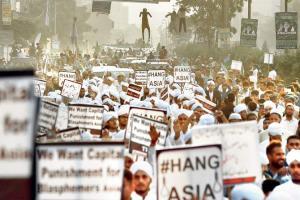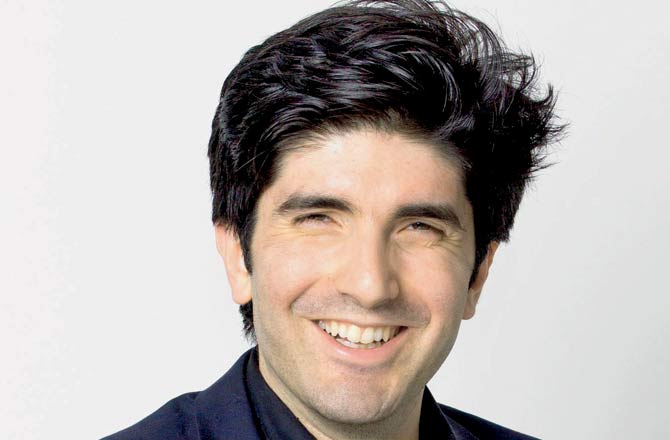In his historicised novel, Pakistani writer Osman Haneef reveals why his country's blasphemy laws are a misinterpretation of Islamic scholarship, and why someone must question them

In this file picture from November 21, 2018, Islamist activists are seen carrying placards against Asia Bibi, a Pakistani Christian woman, who was released after spending eight years on death row for blasphemy, in Karachi. Pic/Getty Images
Every once in a while, comes a novel that makes you realise that your problem is not yours alone. Where the growing right-wing extremism in India has ruffled the minorities, and even spurred riots right before the Coronavirus outbreak shifted the country's focus, in neighbouring Pakistan, similar battles are being fought. And this is often exacerbated by the upholders of law.
Pakistani writer Osman Haneef's new novel, Blasphemy: The Trial of Danesh Masih (Readomania Publishing) is an insightful account of the consequences of ill-thought, morally corrosive laws. Through the story of Danesh, the young son of a Christian house-help, wrongly charged for blasphemy, Haneef explores Pakistan's controversial law.
ADVERTISEMENT
Only earlier this week, the brother-in-law of Asia Bibi—a Pakistani Christian woman who was convicted of blasphemy by a court and sentenced to death by hanging, before being acquitted by the apex court in 2018—was murdered in Sheikhupura city of Punjab, once again putting the spotlight on killings in the name of religion.

Osman Haneef
Haneef, who has worked as TV actor, a strategy consultant, and a diplomatic adviser, and was selected as a Young Global Leader by the World Economic Forum in 2017, hopes his "novel can reopen a conversation about reform", which he says is a "difficult hill to climb".
Edited excerpts from the interview.
Pakistan's blasphemy laws have been a concern for human rights activists and academicians alike. What prompted you to write this novel now?
I wrote the first draft without a strong sense of the narrative arc. But no matter what I wrote, my mind kept returning to a blasphemy case from the 1990s. An illiterate teenage boy, Salamat Masih, and two others, were accused of writing blasphemous statements on the wall of a mosque in a village in Punjab. There was no physical evidence, and the judge was never told what was actually said because to repeat the statement, would have been blasphemous. The conviction was eventually overturned, and Masih fled the country. However, the glaring injustice of an innocent boy wrongfully convicted in a Kafkaesque court proceeding in Pakistan stayed with me. I had to tell this story.Whether it's Asia Bibi [she spent eight years on death row], [lawyer] Rashid Rahman, who was gunned down, or now [university lecturer] Junaid Hafeez, we have seen people twist the law to their own ends, and the topic, sadly, has stayed relevant.
Though Pakistan is one of the 13 countries where blasphemy is punishable by death, it hasn't executed anyone for the same as yet. But, mobs have been using "death penalty" as a sanction for vigilante killings".
When I was creating the character of Pir Piya, a religious figure in the novel who uses the blasphemy law to further his own end, I examined much of the literature around religious radicalisation. The research on religious extremism examines the issue from an individual, organisational, societal, economic, and historical dimension. It is fair to say that the Islamisation of Pakistan under Zia [former President Muhammad Zia-ul-Haq] has twisted narratives to spread an extremist ideology in Pakistan, which has created an acceptance and understanding of the law among the general population. It is this acceptance that made people flock to Mumtaz Qadri's [the assassin of politician Salmaan Taseer] funeral. But it is also worth noting that this extremist ideology doesn't explain why certain individuals become radicalised and others don't. After all, for every Mumtaz Qadri, there are countless human rights activists and campaign leaders, such as Asma Jahangir, who have fought for a more tolerant and open society. And when individuals turn to religion as a form of oppression, it is often a convenient tool rather than the actual reason. For instance, in the novel, Danesh is not accused of blasphemy because of a religious reason, but because of a spurned lover.
Part of your novel has been historicised, blurring the lines between fact and fiction. Why did you choose this treatment over, say, a straight non-fiction account?
I didn't just want to tell the story of a single blasphemy trial. I wanted to tell a story that would be compelling, multi-layered, and engage the reader on multiple issues. Fiction allowed me to explore the underlying motivations of the characters, which is not always possible in non-fiction accounts, and to cover multiple truths.
The very nature of this novel, involves walking a tightrope. Are you prepared for the backlash?
Honestly, I don't know. When I think about people like Salman Taseer, who was unjustly murdered because of his moderate views and advocacy, I worry. But if those of us who are able to speak out, don't because of our fear, we will abdicate the decision making to more extreme factions of our society, and we will all pay the price.
Do you think Pakistan would some day be in a position to repeal this law? What is the country's stand on the issue, currently?
We must have hope. The blasphemy law in its modern form and its repercussions have come about because of Zia's [ul Haq] government and policies of Islamisation. It is not an essential part of the fabric of our culture and society, but there are elements who want to make it one. The basis of an unpardonable death penalty for blasphemy is a misinterpretation of Islamic scholarship. If we could reopen the debate around the original interpretation, we could at least remove the most abhorrent features of the law. However, currently, any political leader who challenges the law or proposes any amendments faces very real threats to his or her personal safety and security.
Catch up on all the latest Mumbai news, crime news, current affairs, and a complete guide from food to things to do and events across Mumbai. Also download the new mid-day Android and iOS apps to get latest updates.
Mid-Day is now on Telegram. Click here to join our channel (@middayinfomedialtd) and stay updated with the latest news
 Subscribe today by clicking the link and stay updated with the latest news!" Click here!
Subscribe today by clicking the link and stay updated with the latest news!" Click here!







